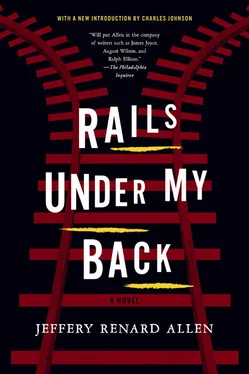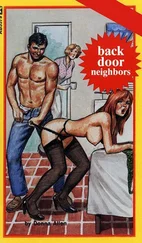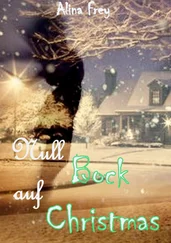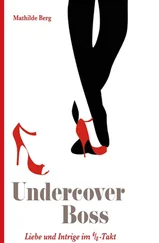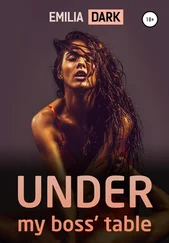Sam out of danger, Gracie returned home. She needed a Scripture to celebrate his recovery. She kept her Bible high on the closet shelf, away from cheese-seeking mice. She opened the closet and found a baby — the first of many she would battle or evade in all the years that have followed — nibbling the pages.
THE BIBLE was the only gift Daddy Larry ever gave her, four-leaf clovers inside, small dried bookmarks picked by his own Houston hand. She brought it with her when she came North. Why come North? To escape finger-cutting cotton fields. To avoid bundles of cotton inside some cracka’s house, shirts, skirts, socks, draws, and sheets. So, go North where yams grow in the sidewalks, lemonade flows from fire hydrants, and the sky rains silver and gold. Bumping her Bible and her suitcases against seat sides on the whistling northbound steel-smoking hound that dragged her past black ‘Sippi fields and yellow oceans of corn to this red gray green city. A rich, hideous city built of stone and steel and mist. Tall buildings — cliffs of solar glass — side by side, no elbowroom between them. Their shadows slanting across the train’s steamy window. Beggars seated in their depths. Tar Lake at the end of every street. A flow of people moving up and down the avenues, circling a drain of boulevards. Winking traffic lights. Congested cars moving terrapin-slow. Light or dark square cars, not the bright-colored round cars people drive today. Great green buses driving a wedge through streets. Ties hauling suitcases. High-butt women in tight weaved dresses shaking keys. I got a rainbow wrapped and tied around my shoulder. Tough boys shoving their faces into each other. One of the mysteries of city breeding. Life in proportion to beauty. This place up North was not in God’s world.
The conductor took her suitcase without her asking, and beckoned her to step down the train’s narrow metal stairs where a small metal footstool awaited her on the platform. With one hand firmly holding the passenger railing and the conductor guiding her by the elbow, she turned her back to the platform, curved her Bible discus-like up to her chin, eased one heel then the other onto footstool, and took a short hop to city concrete. She retrieved her suitcase, thanked the conductor, then headed for the station lobby, past passengers training or detraining and cars steaming in wait.
Gracie! Beulah opened her arms like a strong machine, curved black hat like a snail shell on her head. Hair below her shoulders in one electrified whitening ray. She sucked Gracie in with vacuum power and speed.
Hey, Beulah. Glad to see you.
Beulah loosened her grip just enough to allow Gracie to angle, bend, and hug Sheila.
Gracie. Sheila’s hand rubbed concrete circles on her back. Gracie. So glad to see you.
Gracie searched the words for warmth and truth.
You, redcap! Beulah screamed. Come take my niece’s bags.
Once home, Sheila and Beulah allowed her an hour to bathe and rest, then guided her out of the apartment to discover the city. She can still remember smartly dressed city people betaking themselves to their chosen destinations, remember the casual walk to the Elevated platform, her first sight of a green commuter train, car doors rattling sliding banging open, and city people charging out like racehorses. Faces at every window formed a chain of countless eyes all staring at her. She clutched her Bible to her freshly bathed and powdered bosom. Train rocked and rumbled by.
This not our train? she asked.
No, Beulah said.
That’s when Sheila explained the city’s complicated network of trains and lines: subway and Elevated, A train and B train, express and local, rush hour, the Englewood line, Howard line, Jackson Park line, Evanston line, Ravenswood line. On and on.
Memphis had only buses. Surely city trains would shake her to pieces.
The three women boarded their train. Sat side by side. Gracie placed her Bible on her lap and folded her hands over it. The train began to move. Quicken. She stared out the green-flying window as a lens, clicking mental photographs at rows of shops and stores exposed to merciless morning sunlight, at streets boiling with life and trouble, pools of people linking into other pools, rivers of cars linking other rivers — things as common to northern city life as dog and dung on a ‘Sippi road. She dug her fingernails into the green leather seat.
Beulah and Sheila shuttled her all over the city, the ins and outs, from the (seemingly) penthouse-high elevated trains to the sewer-low subways. She saw a subway minister for the first time.
It is written in the Scriptures, Be not deceived God is not mocked, for whatsoever a man sows he shall also reap the same. Good for good and evil for evil. The Lord has sown his good seed into the world today and should it fall on good and pure hearts it shall bring forth much good. So you have the faith, but you must plant it in good soil in order for you to do great things. But mortal soil cannot produce eternal things. One must place his faith in God. This is the best soil.
She would learn, here in the North, many preachers carried pulpits in their voices. Even frail-bodied subway evangelists like Mother Sister could paddle you with wood words. They got wings for us to fly around. And water beds filled with blue rivers. But rent in heaven ain’t cheap. Nor are flying lessons.
Beulah found Gracie a job (day work) with the Sterns in Deerfield, a sharp, clean suburb a good hour north of the city. Train, carry me. Train, bring me back.
HER FIRST CITY WINTER. Snow. Pretty when it first fell. White and clean enough to eat, then later, gray and muddy with footprints or tire tracks. Snow coating the windows of cars, but the apartment windows heated from the warmth pulsing inside, free of frost, an occasional collar of snow on a ledge. Snow on the bare tree branches — bare branches curled, fingers reaching to grab the falling snow — half the branch white and the other half brown-gray, like flesh slipping out from a split pants leg or coat sleeve. The sky white — the fog white of after-snow — above the buildings. And cars making that washing sound you hear in rain or snow, beneath the motor’s hum the sound of water spilled from a pail. Then the first killing frost. The frozen steel of subway and apartment pipes. The asthmatic breathing of the radiators. (Better than a rusted yard pump and the carrying stones of the fireplace, flames licking — coals really — crackling with heat.) Jack Frost nipping at yo nose and peeking up under yo clothes. Hawk trying to snatch off your draws. Winter laid a sheet of ice between you and yo kinfolk in the apartment. You looking out the white window and thinking, thinking, perhaps of spring — because in this city, winter often carried over into mid-spring, or came back in spurts both spring and summer, like an unexpected relative. Spring: the trees a green maelstrom of mad leaves and brown movement because the city’s wind stayed with you year-round, folding into the seasons. And thinking further of autumn, your favorite season, when the city grew alive with color, the summer’s last fires flicking new flames of heat and pigment, red and green and blue and white and pink and red-pink and brown-red and yellow-brown and not just the pinks and greens and whites of budding May. But fall so far away, not like the babies who stand in the trees all day and night, a few feet from the building.
HER FOURTH CITY WINTER — so it seems to her now — she boarded the train and saw the Burned Man for the first time. A short man and fat, every space of his blue-jean jumpsuit covered with buttons — sermons, slogans, prayers. A few clumps of hair, like an unfinished bird’s nest. And his head a lump of clay kneaded onto his body. No neck, all head. Clean swathes of smooth brown skin — funny how burns leave brown scars, not black — and the face smooth too, no eyebrows or eyelashes or eyelids. He rattled his hot tin cup, the metal sound giving more momentum to the steel wheel grinding steel rails.
Читать дальше
